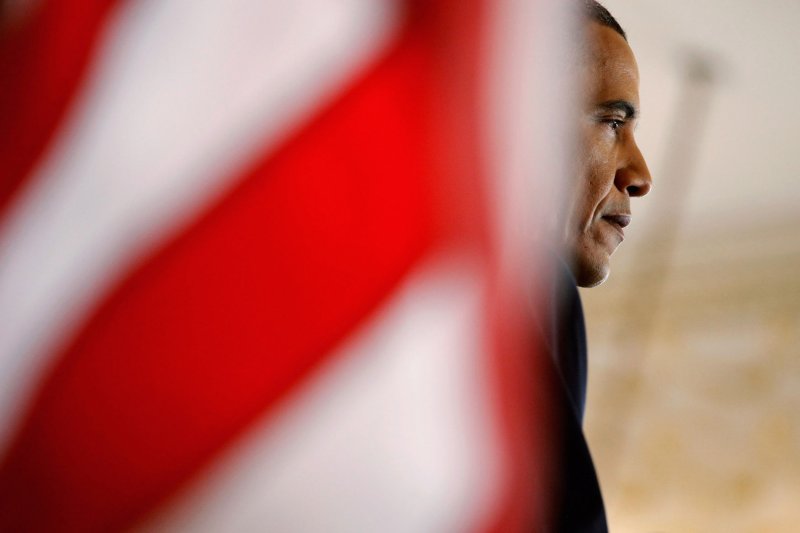1 of 4 | U.S. President Barack Obama delivers a speech on Mideast and North Africa policy in the Ben Franklin Room at the State Department May 19, 2011 in Washington, DC. Through the lens of the popular Middle East uprisings, the killing of Osama Bin Laden and the bloody crackdown on protesters by the Syrian government, Obama attempted to strike a balance between national security and the need for democratic reform in the Arab world. UPI/Chip Somodevilla/POOL |
License Photo
ISLAMABAD, Pakistan, May 23 (UPI) -- Osama bin Laden's demise will have a far-reaching impact on the scale and nature of the Pakistani Taliban insurgency in Pakistan.
The insurgency of Tehrik-e-Taliban Pakistan was conceived and directed by al-Qaida, In fact, it was al-Qaida's influence on the Pakistani Taliban leader Baitullah Mehsud that goaded him to launch TTP in 2007. Moreover, TTP adopted al-Qaida's ideology by introducing a deadly wave of suicide bombings and killings in Pakistan.
Official statistics state that around 35,000 Pakistanis lost their lives in TTP terrorism since 2007. This includes a large number of high-profile killings, such as that of former Prime Minister Benazir Bhutto.
In December 2007, Bhutto told this writer that Osama bin Laden's son, Khalid bin Laden, was involved in a conspiracy to kill her. In that same conversation, she pinpointed Harkat-ul-Jihad-ul-Islami chief, Qari Saifullah Akhtar, for attacks on her homecoming reception Oct. 18, 2007, in Karachi. Akhtar also had long-standing links with al-Qaida.
Al-Qaida's persuasive pressure on Mehsud to form TTP masked a major strategic objective. Osama bin Laden aimed to make Pakistan part of the Afghan theater of war. He reckoned this would raise a large number of additional recruits to fight the U.S.-led coalition of forces in Afghanistan.
Bin Laden was well aware of Pakistanis' susceptibility to manipulation in the name of Islam. He knew this better than other al-Qaida leaders. It was bin Laden who traveled to Pakistan in the early 1980s on the invitation of his mentor, Abdullah Azzam, a Palestinian professor-turned jihadist, to fight the Soviets in Afghanistan.
When jihad was over and the Soviets began withdrawing in 1988, bin Laden had still bigger things on his mind and he founded al-Qaida in 1989. And it hardly came as a surprise that he chose Peshawar, then the capital of Pakistan's North-West Frontier Province (since renamed Khyber Pakhtunkhwa), to launch his organization. It was aimed more at the liberation of the Palestinians than a specific Islamic cause.
But he still valued Pakistani fighters over the Arabs he had recruited to fight the Soviets. In fact, al-Qaida, by aiding and abetting TTP, wanted to repeat what it did in Taliban-ruled Afghanistan.
Bin Laden pinned all his hopes on TTP to lead a successful insurgency in Pakistan and thus install a puritanical caliphate that would inherit the country's nuclear arsenal. Global jihad, as he conceived it, required the structure of a major state. It was in Taliban-led Afghanistan that al-Qaida was free to plot and plan the 9/11 attacks on the Twin Towers and the Pentagon.
Al-Qaida refocused its efforts on Pakistan after the fall of Afghanistan. A more loyal Taliban in Pakistan was indispensable to its survival and to keeping alive the hope of global jihad.
From his secret base in Abbottabad, bin Laden continued to issue secret strategic guidance. His advice was to use bases in North Waziristan and some of the other seven tribal areas in Pakistan's Federally Administered Tribal Areas to launch guerrilla offensives into the Swat Valley and beyond.
In 2009, Pakistani Taliban insurgents got to within 60 miles of Islamabad before fighter bombers and gunships forced them to retreat.
This week 16 of them attacked from three sides and occupied for 15 hours Pakistan's naval base in Karachi, blowing up two aircraft, including a P-3 Orion spy plane given to Pakistan a year ago. Explosions rocked the base during a 10-hour gun battle. Most of the guerrillas were killed as were 12 Pakistani navy personnel. Some militants escaped.
TTP's hope now is that bin Laden's death will have a major impact on the insurgency in Pakistan. After the death of its founder, TTP guerrillas regrouped behind bin Laden's symbolic flag. Even ahead of al-Qaida, it was the first insurgent group to issue a communique pledging to avenge bin Laden's death.
Pakistani intelligence sources say TTP is planning more spectacular attacks.
Unsurprisingly, the Afghan Taliban haven't come up with a strong reaction to the U.S. raid that killed bin Laden, once a mentor and source of financial sustenance to their regime (1996-2001).
Unofficial spokesmen of the Afghan insurgency keep emphasizing they have nothing in common with those who advocate a global caliphate. They say the Taliban stand for the liberation of Afghanistan with no objectives beyond their borders.
For his part, bin Laden always wanted Pakistan and the United States to become enemies. Despite a major crisis in relations between the two countries, triggered by the U.S. Navy SEAL raid that killed bin Laden in an unguarded house in Abbottabad, cooler heads appear to have prevailed -- in both Islamabad and Washington.
For a while, it looked as if bin Laden might get his Islamist prayers answered. No longer.
--
(Ammar Turabi is and a longtime consultant for editors at United Press International. He is creating a think tank, which will be launched next month in Pakistan.)
--
(United Press International's "Outside View" commentaries are written by outside contributors who specialize in a variety of important issues. The views expressed do not necessarily reflect those of United Press International. In the interests of creating an open forum, original submissions are invited.)















